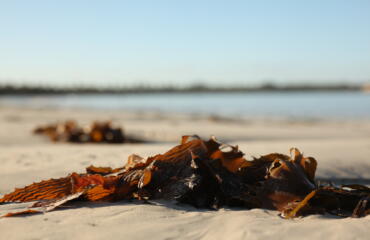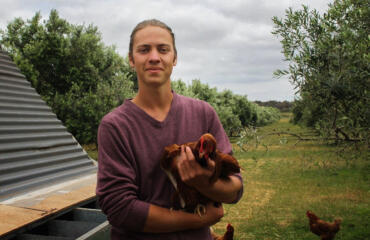As 2020 dawned, Jasmine Wise was diving into an optimistic future, taking the first steps toward settling down in her adopted home town of Cairns in Far North Queensland.
Wise, who moved from the UK in 2018, was living with her boyfriend, Ben Murphy, 29, and together they had just submitted a partner visa. The $10,000 application soaked up most of Wise’s savings, but with two stable jobs in Cairns’ booming diving industry the 24-year-old wasn’t worried.
Then tourism collapsed.
The pandemic has essentially halted international travel and stay-at-home rules have erased domestic tourism nearly overnight. For a city so heavily dependent on tourism – one in five jobs in Cairns is directly linked to the industry – the virus has been devastating. And for Wise, who worked as a dive instructor and part-time waitress in Cairns, the closure of bars, restaurants and reef tours has left her without a job.

Wise first noticed tourism struggling at the beginning of February. The typically busy Chinese new year period was “exceptionally quiet”, she says. But the detection of coronavirus cases in Queensland “cut everything in its tracks”. When borders closed at the end of March, Wise received the fully expected but no less “disappointing” news that she was out of a job.
Like many young Brits, Wise came to Australia to travel. But she fell in love with Northern Queensland while working on farms around Townsville, a stark difference from the medieval arches and North Sea winds of her small English hometown of Norwich.
“I came up to Cairns and just never wanted to leave.”
The region’s internationally renowned reef and rainforest attractions bring in three million tourists a year. Jumping at the opportunity to work in Cairns, Wise moved there in April 2018, meeting her partner, Murphy, while working abroad Seastar Cruises as a divemaster trainee.
After two years in Cairns, her life had a routine. She worked long hours for the family-owned tourist cruise company, usually getting to the boat at six in the morning and returning home 12 hours later.
Aboard the luxury catamaran with its see-through glass-bottom, Wise and the tight-knit crew took tourists on diving and snorkelling full-day excursions to the outer Great Barrier Reef. Underwater, Wise guided the tourists through bright coral gardens and abundant marine life, often pointing out her favourite marine creature, the giant clam. “You can trick them to make them close.”
Comparatively, the indoor quarantine has been “a bit boring”. But job hunting has been keeping Wise busy. She’s applied for positions all over town, including openings at Coles, Woolworths, McDonald’s and Dominos. In her frantic search, Wise says she would be happy with “literally anything”. But even in these minimum wage industries, she’s found securing employment in Cairns is “incredibly hard due to high demand for jobs right now”.
Job searches online may be bleak but outside Wise is confronted by a “desolate” Cairns. The city resembles a “ghost town” rather than a tourism centre.
With its heavy economic reliance on tourism generally and international tourism in particular, Cairns stands to be the Australian city hit hardest by the enduring border closures.
The international tourism market is worth $7 billion a year to the Queensland economy, and well over $1 billion to Far North Queensland. It is now over seven months since the region welcomed any overseas travellers.
“To date, the region has lost in excess of $500 million in visitor spending compared to previous years,” says CEO of Tourism Tropical North Queensland, Mark Olsen.
He estimates 13,650 jobs will be impacted by the end of the year and the region’s “recovery will take at least five years”.
Wise and her partner lost their jobs in the same week. Murphy was granted Jobseeker payments of $640 a fortnight, but as a foreigner, Wise wasn’t eligible. With her savings drained after applying for the partner visa, the couple has been scraping by on welfare payments designed to support a single person. Weekly rent of $300 meant the couple was left with just $40 a fortnight for living expenses and bills.

UK citizen Wise, in the process of applying for Australian partner visa, has found herself falling between the cracks of both the British and Australian pandemic welfare arrangements.
“I have zero savings from the [partner] visa, like absolutely nothing left,” Wise says. The unpredicted financial hardship of the coronavirus “massively impacted us”.
“It got pretty scary then.”
Eventually Wise was able to access her superannuation and Murphy secured fortnightly Jobkeeper payments of $1,500. While she’s relieved the situation is no longer “impossible”, it’s a long way from the financial stability of her pre-coronavirus life.
As an expat, Wise was caught in an international welfare limbo when COVID hit. Living outside the European Economic Area disqualifies her from receiving British benefits. In Australia, she is a temporary visa holder awaiting permanent residency from her partner visa. The visa is meant for married couples or partners in de-facto relationships where one is an Australian citizen.
During the two-year partner visa application process she’s technically sponsored by Murphy, meaning he’s financially responsible for her.
“I have been classed as a temporary visa holder, although I have migrated here and Australia is my home,” says Wise.
“If my partner visa had already been granted, then I’d be able to apply for Centrelink or Jobkeeper. But because it hasn’t, I’m not eligible for either of them.”
She says it is “a little annoying” to have fallen through the cracks of government support during a global crisis, she acknowledges that “it’s just how it is at the moment, they’re prioritising Australians”.
Wise misses socialising with her colleagues and being in the ocean. But she’s grateful to spend more quality time with her partner during the lockdown. “I have been financially dependent on him throughout this.”
“I feel like we are both very supportive towards each other, this has made us stronger if anything.”
This project is a result of a partnership between the Guardian Civic Journalism Trust and the Centre for Advancing Journalism at the University of Melbourne. Reporting contributed by: Alyssa Herr, Anthony Marsico, Ashleigh Barraclough, Connor Webster, Else Kennedy, Fia Walsh, Jordyn Beazley, Liam Petterson, Petra Stock, Sean Goodwin, Thomas Phillips and Wing Kuang. Visit the full interactive package co-published with Guardian Australia here.


